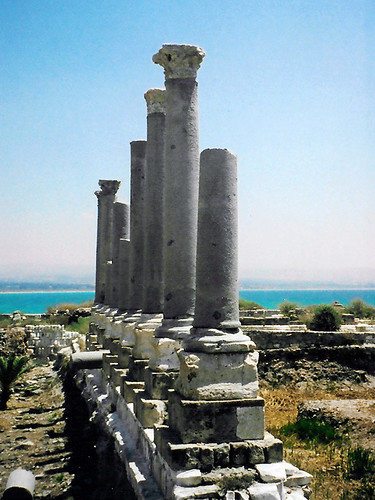Saturday, September 02, 2006
War at World

(So much owed by so many, to so many by GMS (Verdun))
Nope, not a typo. "World at War" sounds catchy, but the reality is actually the opposite. America is at war with the world.
Today I'm thinking about war. Actually, I think about it frequently, but don't often feel like writing about it.
Aggression drives technological advance. Our Cro-Magnon ancestors aggressively moved into Europe to compete directly with the Neanderthals already living there. The Neanderthals were not very aggressive, had reached a state of equilibrium with respect to their environment, and were no longer progressing technologically. They had found a recipe for living which suited them and saw no reason to change it.
Neanderthals are no longer around. (At least, not as a distinct species.)
So too little aggression can be a bad thing. Is there such a thing as too much?
The former Soviet Union got suckered into a ridiculous peace-time arms race with the United States. Reagan's "Star Wars" defense program - the Strategic Defense Initiative, a pet project of the current Secretary of Defense, Donald Rumsfeld - has been given credit for bringing down the USSR. What's ironic here is that the US had actually been propping up the USSR for some time through mechanisms such as Nixon's wheat deal. (See also Will CCC Be Allowed to Waste More Taxpayer Dollars Propping Up Tyranny? (The Center for Security Policy).) Even more ironic: Carter terminated the subsidized wheat deal for the USSR.

(050224-N-0000X-001 by chrismn2006)
Why keep the USSR up and running? Answer: We weren't propping up the USSR, we were propping up the Cold War. That is, we were feeding the monster which Eisenhower warned would threaten our freedoms and democratic institutions: the military-industrial complex. Détente and the thawing of US-Soviet tensions threatened the military-industrial monkey on our backs. The unworkable "Star Wars" scam shored it up again. (And it's back, by the way: U.S. Test Missile Hits Mock Warhead by Julian E. Barnes, Los Angeles Times.) The Soviet Union was already very much on the ropes, socially and economically. By the USSR allowing itself to be drawn by the US into a spending contest, check-mate was given and accepted. The Cold War game was over.
Too much aggression was a disaster for the Soviet Union.
Empires exist to exact tribute from other sovereign states. Which is to say, they are rackets set up to forcibly extract resources which belong to others. They are often economically unsustainable, since over time they invest a lopsided portion of their resources in their militaries, resources which would otherwise be dedicated to productive sectors of a healthy economy. A principal reason for the fall of Rome is simply that Rome extracted - which is to say, "took" - raw materials from her conquered provinces, shipped them East, then reimported those same materials as finished products from the East. Any raw material (copper, say) is worth more after work has been performed on it (e.g., a copper pot) than it is in its original raw state. How long could Rome sustain this trade deficit? Rome lasted centuries, even as she rotted from within. Not all empires are so lucky, however. Ask Alexander and Attila. (Don't ask Napoleon and Hitler; history's verdict on their efforts is a foregone conclusion.) The British Empire succeeded where others failed by embracing the Industrial Revolution. Britain continued to produce goods and generally kept the health of the economy as a top concern.

(No. by Cecelia... —>)
The British Empire in turn gave birth to its American successor. How long will the Project for a New American Century (PNAC) maintain American dominance? Even with the help of a new Pearl Harbor or two?

(<— The Price of Oil 8 by My Life as a Haint)
Thanks to globalization, America's manufacturing base is withering away faster than you can say World Trade Organization. We'll be joining Rome soon enough.
Meanwhile, maybe some of us are catching on?
Polls show opposition to Iraq war at all-time high by Tom Regan (Christian Science Monitor)
September 1, 2006
A series of polls taken over the last few weeks of August show that support for the war in Iraq among Americans is at an all-time low. Almost two-thirds of Americans in each of three major polls say that they oppose the war, the highest totals since pollsters starting asking Americans the question three years ago. Many of the polls were conducted in advance of the fifth anniversary of the September 11, 2001 attacks on Washington and New York...

(Hope for peace (South of Lebanon) by cocolinda)

(So much owed by so many, to so many by GMS (Verdun))
Nope, not a typo. "World at War" sounds catchy, but the reality is actually the opposite. America is at war with the world.
Today I'm thinking about war. Actually, I think about it frequently, but don't often feel like writing about it.
Aggression drives technological advance. Our Cro-Magnon ancestors aggressively moved into Europe to compete directly with the Neanderthals already living there. The Neanderthals were not very aggressive, had reached a state of equilibrium with respect to their environment, and were no longer progressing technologically. They had found a recipe for living which suited them and saw no reason to change it.
Neanderthals are no longer around. (At least, not as a distinct species.)
So too little aggression can be a bad thing. Is there such a thing as too much?
The former Soviet Union got suckered into a ridiculous peace-time arms race with the United States. Reagan's "Star Wars" defense program - the Strategic Defense Initiative, a pet project of the current Secretary of Defense, Donald Rumsfeld - has been given credit for bringing down the USSR. What's ironic here is that the US had actually been propping up the USSR for some time through mechanisms such as Nixon's wheat deal. (See also Will CCC Be Allowed to Waste More Taxpayer Dollars Propping Up Tyranny? (The Center for Security Policy).) Even more ironic: Carter terminated the subsidized wheat deal for the USSR.

(050224-N-0000X-001 by chrismn2006)
Why keep the USSR up and running? Answer: We weren't propping up the USSR, we were propping up the Cold War. That is, we were feeding the monster which Eisenhower warned would threaten our freedoms and democratic institutions: the military-industrial complex. Détente and the thawing of US-Soviet tensions threatened the military-industrial monkey on our backs. The unworkable "Star Wars" scam shored it up again. (And it's back, by the way: U.S. Test Missile Hits Mock Warhead by Julian E. Barnes, Los Angeles Times.) The Soviet Union was already very much on the ropes, socially and economically. By the USSR allowing itself to be drawn by the US into a spending contest, check-mate was given and accepted. The Cold War game was over.
Too much aggression was a disaster for the Soviet Union.
Empires exist to exact tribute from other sovereign states. Which is to say, they are rackets set up to forcibly extract resources which belong to others. They are often economically unsustainable, since over time they invest a lopsided portion of their resources in their militaries, resources which would otherwise be dedicated to productive sectors of a healthy economy. A principal reason for the fall of Rome is simply that Rome extracted - which is to say, "took" - raw materials from her conquered provinces, shipped them East, then reimported those same materials as finished products from the East. Any raw material (copper, say) is worth more after work has been performed on it (e.g., a copper pot) than it is in its original raw state. How long could Rome sustain this trade deficit? Rome lasted centuries, even as she rotted from within. Not all empires are so lucky, however. Ask Alexander and Attila. (Don't ask Napoleon and Hitler; history's verdict on their efforts is a foregone conclusion.) The British Empire succeeded where others failed by embracing the Industrial Revolution. Britain continued to produce goods and generally kept the health of the economy as a top concern.

(No. by Cecelia... —>)
The British Empire in turn gave birth to its American successor. How long will the Project for a New American Century (PNAC) maintain American dominance? Even with the help of a new Pearl Harbor or two?

(<— The Price of Oil 8 by My Life as a Haint)
Thanks to globalization, America's manufacturing base is withering away faster than you can say World Trade Organization. We'll be joining Rome soon enough.
Meanwhile, maybe some of us are catching on?
Polls show opposition to Iraq war at all-time high by Tom Regan (Christian Science Monitor)
September 1, 2006
A series of polls taken over the last few weeks of August show that support for the war in Iraq among Americans is at an all-time low. Almost two-thirds of Americans in each of three major polls say that they oppose the war, the highest totals since pollsters starting asking Americans the question three years ago. Many of the polls were conducted in advance of the fifth anniversary of the September 11, 2001 attacks on Washington and New York...

(Hope for peace (South of Lebanon) by cocolinda)


